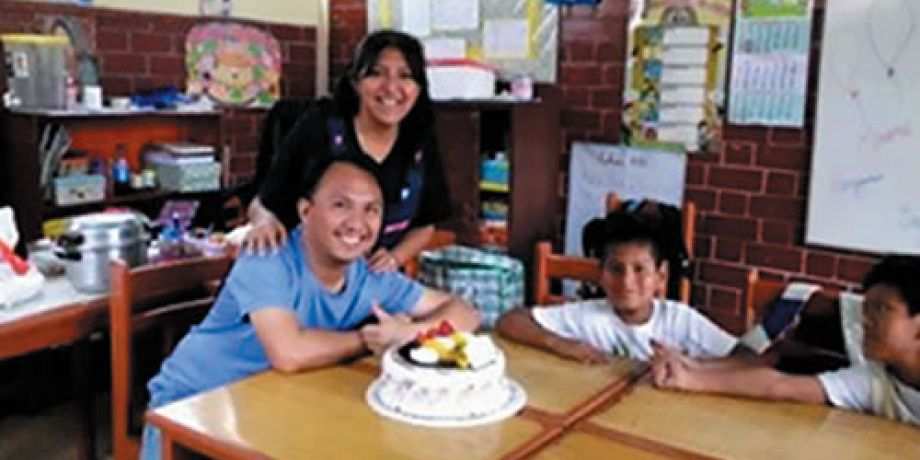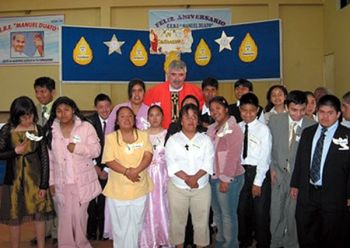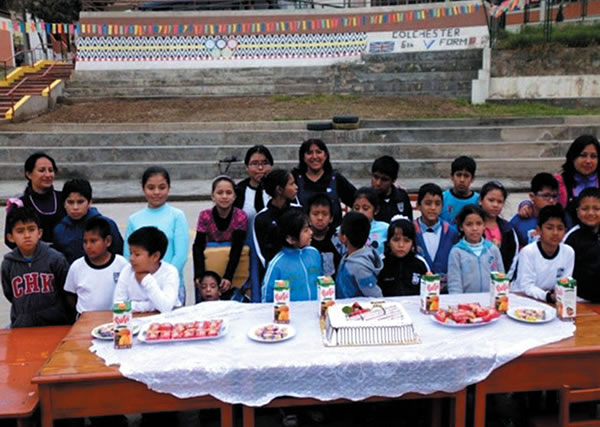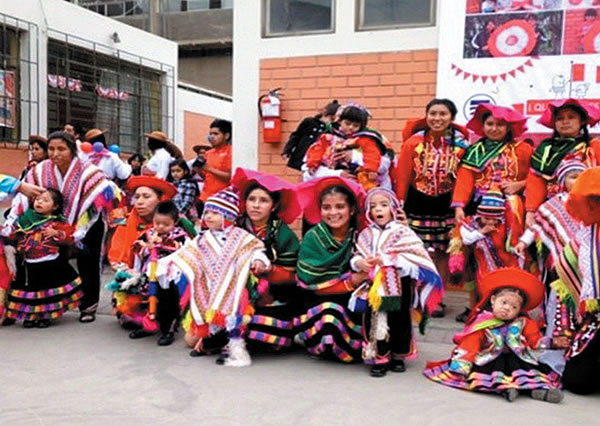
Finding My Vocation
Aside from my parish involvement, one of the most memorable experiences that I had in Peru was my ministry in Manuel Duato, a special institution which provides basic education for persons with special needs. The school was founded by Fr. Agustin Garvey and Sr. Elizabeth Doyle in July 16, 1976, whose efforts made a tremendous impact in the lives of the marginalized people of Lima. Recently, Manuel Duato has been supervised by Columban Fr. Edward O’Connell.

With the help of the local government Manuel Duato continues to provide integral formation to students with different needs including those who have cognitive challenges, are deaf-mute, are physically handicapped or have multiple disabilities. Aside from the teachers, the role of the parents has a significant contribution in the formation of the students.
After months of language study and exposure to different Columban ministries I was able to discern what kind of ministry I wanted to do throughout my whole First Missionary Assignment (FMA) program. There was something in Manuel Duato that caught my attention and made me decide to express my willingness to work with persons who have special needs. I started my ministry in March 2015 with two groups—one in the morning and the other in the afternoon.
The first group I worked with was people who were deaf-mute. Working with them suited my interest since I had a good background in dealing with hearing-impaired cases. Before I joined the seminary, I worked with the deaf ministry in my home parish for almost seven years. I had a memorable experience with the hearing impaired; being with them was like encountering someone dear to you. I was very eager to work with them and excited to use the sign language that I learned a few years ago.
Having introduced myself in front of them, I was surprised because none of them understood my signs except their professor, Ms. Guadalupe Jara, who is also deaf but knows lip-reading. All of a sudden my confidence was completely shaken, and I didn’t know what to do. After all I thought that the sign-language hat I learned was universal. With the assurance of Ms. Lupe, she helped me compose myself.
Learning two languages at the same time drove me crazy. Most of the time I had to construct my sentence in Spanish first before translating it to Peruvian sign language. It is part of the whole process in getting in touch with the lives of the people with whom you are called to minister. I would admit that there were difficult times which made me upset with myself. I became impatient and began to push myself too much. As I encountered these challenges I’ve learned that there are no shortcuts. I needed to go through the processes in order to learn. The reassuring presence of a friend who herself is hearingimpaired gave me enough energy to learn and re-learn the signs all over again. I remember when she told me that in learning the language of the deaf, one has to experience deafness for himself.

We can only appreciate the world of deafness if we allowed ourselves to be deaf in a sense of being in communion with them. Her years of experience taught her to be in solidarity with her students. At times she had to immerse herself in the level of her own students as if she started from scratch. In doing this she would convey the right message to her students effectively. This was the most challenging part of being a teacher but the most fulfilling experience that we could have. These lines of thought inspired me. She even told me to allow the kids to teach me, and I would be surprised that they can be good teachers.
As time passed by, I enjoyed learning new things from the kids. When things started to become mundane, I always reminded myself about what Ms. Lupe said about ministry – that it is not about accomplishing things but rather learning the value of everything that you do. I entered into their world which made me appreciate the values that they have imparted in me. Their joy is so contagious that it brought life to our classes. I’ve realized that teaching is not only about reading, arithmetic, arts, and writing. Teaching is also inculcating values behind the things that you do. If you know the value of what you are doing then you will really appreciate the time that you spent on it. I learned to establish my value by loving my ministry.
Time flew very fast, and I did enjoy every single moment with the students. I was able to establish a deep relationship with them, and through them I was able to find my vocation. The best learning experience that I had with them was to how to stick with the non-negotiables in life such as love, joy and solidarity. My whole experience with them reflects the three essentials elements of Christian life. I couldn’t imagine a Christian community without love, joy and solidarity.
I am forever grateful to the hearing impaired students with whom I ministered. Through them I was able to make myself available to another group at Manuel Duato on Monday afternoons. This is the group of students who have different cases such as Down syndrome, cerebral palsy and multiple disabilities. They called themselves Club de Amigo (Friends Club) because of the belief that friendship is at the heart of every gathering.
Basically, the nature of my ministry with them was more of companionship since they have their own teachers who are psychologists and occupational therapists by profession. Aside from basic learning skills like greeting and introducing themselves to others, they were also taught how to do routine tasks like eating by themselves, cleaning their own utensils and taking care of school property. These have always been the focus of their learning. Most of them are older and bigger than me. Whenever they had occasional meltdowns, it took much effort to calm them down. It would take a significant amount of experience to handle it. I was not prepared for this ministry! Nevertheless, with the help of some volunteers, I learned how to handle certain situations that needed my help. Of all the ministries that I did in my entire seminary life, this was the most challenging yet very fulfilling. Every time I accompanied them in doing manual exercises I also felt that like them, I have my own share of weaknesses, and I also need the help of others.

It is in their vulnerability that I saw my share in this limited world where everyone is encouraged to do their part to make this world worth living. When I saw them smiling and laughing, as we were completing our tasks, the joy within me is overflowed. Walking with them made me realize how privileged I was. They taught me so many valuable lessons in life which I will bring with me for a lifetime. I learned to laugh with them even in times where jokes didn’t appeal to me. Their joy was very contagious, and it seems that every day is a celebration of life. No one was bothered by their physical and mental condition. They always had reasons to celebrate and to be thankful for everything they had. I was touched by their simple gestures. My journey with them allowed me to leave my comfort zone. At times I am pre-occupied with my own concerns to the extent of neglecting my social responsibility to others. When problems overwhelm me I tend to forget to appreciate the present moment. Looking at them gave me the impression that they had no idea of what their past and future would be. They lived at the present moment by being grateful for everything that they have. Being in this ministry reminded me to be grateful for what the present moment has to offer.
In the span of one year I would say that I was no longer the same person a year before I left the Philippines. There were many good experiences that molded me to become a better person. Two different ministries have enriched my life and prepared me to be a person for, by and with others. Looking back, my experiences in Manuel Duato helped me appreciate the inner child within us. It is by being a child where we learn the basics in life such as love, joy and solidarity. It is the innocence of the child that really captured my attention. It comes as no surprise that Jesus uses the image of the child in the Gospel several times to remind us to be like them. Jesus said: “Truly I tell you, unless you change and become like little children, you will never enter the kingdom of heaven.”
I believe that my ministry with these two special groups in Manuel Duato prepared me for something great in the future. I wish I could spend more time with them but my mission in Peru had to end. Retelling this story magnifies my soul for it is God who sent me there not only to do my mission but also to learn the value of my mission. After all being a missionary is not about accomplishing many things. It is more than this. It is a vocation. When you love what you are doing because the people whom you are ministering with have instilled the value of your ministry, your work becomes a vocation. Therefore I would say that “In the eyes of the child” I found where my vocation is, which is to love and serve the Lord in everything.
Originally from the Philippines, Erl Dylan Tabaco is a Columban seminarian.